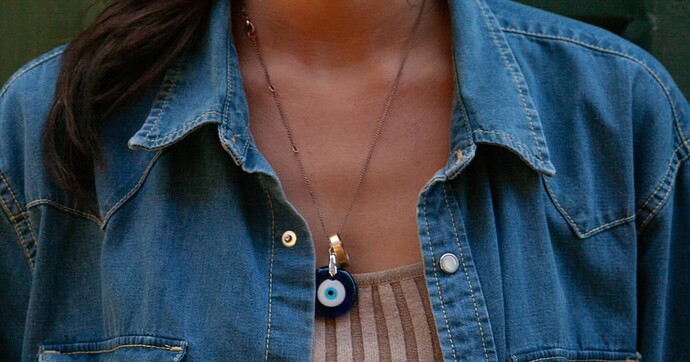Christian Response to Wearing the Evil Eye – What Does the Bible Say?
You asked, “Can Christians wear the evil eye charm if it’s just fashion?” Let’s reframe it for maximum clarity: Does the Bible support Christians wearing symbols with pagan, occult, or superstitious origins—even if they’ve been repackaged as cute accessories?
What Scripture Actually Teaches
Let’s not sugarcoat it: the “evil eye” is not just a trend—it’s a talisman rooted in pagan mysticism, intended to deflect curses through magical means. That’s not just bad fashion, that’s bad theology. Slap a stylish band on a Ouija board and it’s still a spiritual trap.
“Do not turn to mediums or seek out spiritists, for you will be defiled by them. I am the Lord your God.” — Leviticus 19:31
You don’t baptize superstition by calling it “style.” You just blend spiritual compromise with cultural conformity. That’s syncretism, plain and simple—and God didn’t save you from darkness so you could wear it on a bracelet.
Three Biblical Truths About Spiritual Symbols
1. You Can’t Serve Two Masters (Matthew 6:24):
Wearing the evil eye while claiming Christ is like locking your front door and leaving the back wide open to the enemy. You either trust God’s protection—or you don’t. There’s no holy hybrid between Jesus and a pagan lucky charm.
2. God Hates Mixture (Deut. 18:10–12):
Israel was commanded not to dabble in the detestable practices of surrounding nations—why? Because those “harmless” rituals invited spiritual rot. Same poison, new packaging.
3. The Armor of God Doesn’t Include Amulets (Ephesians 6:10–18):
You want protection? Try truth, righteousness, faith, salvation, the Word, and prayer. Not a glass eyeball swinging from your wrist like a spiritual air freshener.
False Doctrine in Focus: “It’s Just a Trend”
If Satan can’t make you deny Jesus, he’ll dress up idolatry in rhinestones and get you to wear it in His name. The evil eye isn’t neutral—it’s a spiritual statement, whether you mean it or not. And the message is this: “God’s not enough to guard me, so I’ll hedge my bets.”
“You cannot drink the cup of the Lord and the cup of demons too.” — 1 Corinthians 10:21
That verse wasn’t a suggestion. It was a line in the sand.
Final Word: Identity Check
Why wear a symbol of fear when you’ve been sealed by the Holy Spirit? Why flaunt superstition when you’re clothed in righteousness? Christian, you weren’t called to blend in with Babylon—you were set apart to stand out for the Kingdom.
So ditch the trinket. Burn the charm. And don’t just ask “Is it wrong?”—ask “Does this glorify Christ?”
Next: Should Christians burn sage or use crystals for ‘cleansing’?
—Sincere Seeker. Scripturally savage. Here for the Truth.
